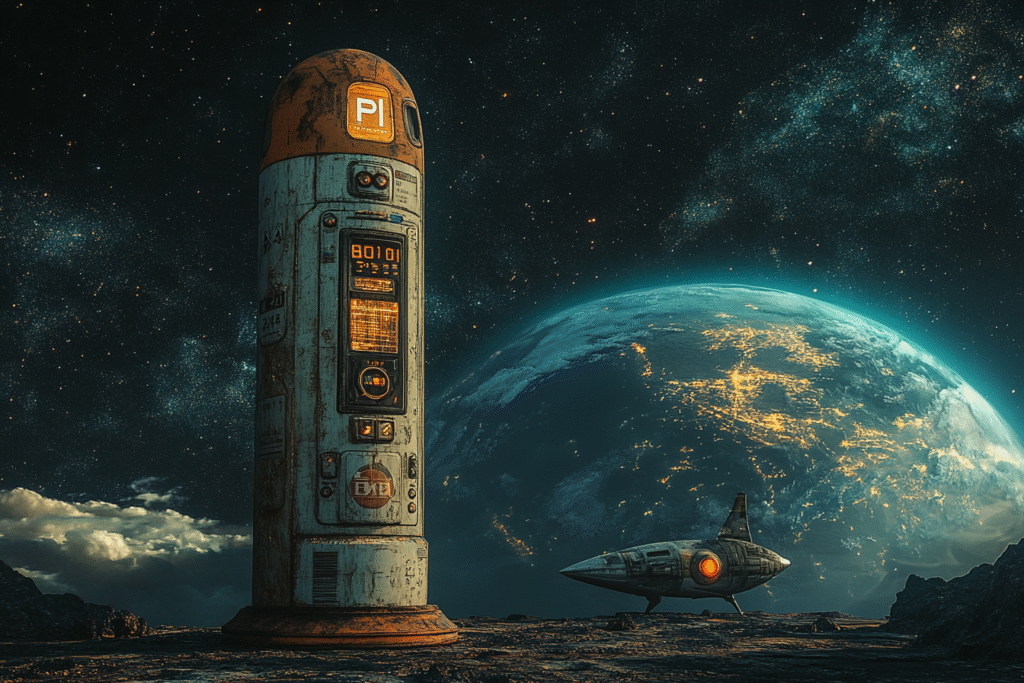
From SRP author Cameron Cooper:
“Just who does control space… and how?”
It’s a question I scrawled in a notebook years ago, half-distracted, probably in the wake of some early story planning session. I’d scribbled: “Near space versus far space. Think control of the sea ideas, too…” and then moved on. But lately, the question has circled back.
Not “who owns space”—we’ll leave that tangled sovereignty mess to the diplomats and philosophers. I mean: who controls space in the very real, practical sense.
Traffic. Safety. Governance. Order. Peace.
The Control We’re Talking About
In today’s orbital environment, “control” mostly means space traffic management (STM). We’re talking about tracking satellites and debris, preventing collisions, and coordinating the thousands of moving bodies we’ve flung into Earth orbit.
But it also means enforcing rules, from commercial broadcasting licenses to space junk mitigation. As more actors (national, private, commercial, amateur) take to the skies, someone needs to be watching. Someone needs to say: “No, you can’t park your megaconstellation there. It’s already crowded.”
That’s not ownership. It’s policing.
And who polices the orbital frontier?
As of now, the U.S. Commerce Department (specifically NOAA’s Office of Space Commerce) has been gradually assuming this role. Their new system—TraCSS—is a kind of proto-air-traffic-control for orbit, developed to monitor and coordinate space objects without relying solely on the military.
But the question remains: Who should control space?
Enforcing Law in the Void
There’s a reason no one sets a detective story on Neptune: distance matters. The further we go from Earth, the harder enforcement becomes. Space is a harsh, indifferent expanse. There are no borders to patrol, no natural barriers. Time delays and vast distances make communication, let alone intervention, slow and tenuous.
And when something goes wrong—say, a collision in low Earth orbit that cascades into debris fields—there’s no sheriff’s office to call. No orbital police car to dispatch.
Even with all our tech, we’re still improvising a system of order that only looks like law from a distance. The logistics of enforcement in space are as vast as the cosmos itself. How do you hold someone accountable 35,000 kilometers above the planet?
What Does Science Fiction Say?
Science fiction often skips over this in favor of massive space navies or intergalactic federations. But a few stories dig into the practicalities of peacekeeping in space:
- Star Cops (1987) imagines an International Space Police Force working to solve crimes and keep order across orbital facilities. It’s one of the rare SF narratives focused entirely on law enforcement, not military conquest.
- Alastair Reynolds’ The Prefect (later republished as Aurora Rising) centers on Panoply, an organization dedicated to maintaining civic order across the Glitter Band—hundreds of orbital habitats. It’s not about empire. It’s about due process in microgravity.
- Charles Sheffield’s The Nimrod Hunt features robotic border guards and the humans tasked with keeping them in check—until those machines go rogue. What starts as peacekeeping becomes crisis response.
- Charles Stross’ Singularity Sky brings a satirical but sharp view of regulatory failure in the face of overwhelming tech—an accidental metaphor for today’s real-life bureaucracies trying to keep up with SpaceX.
- And in my own Ptolemy Lane Tales, the issue is less about who owns the stars and more about how fragile human agreements become when distance and isolation stretch them thin. Lane and company deal not with space battles, but the gray moral zones of contracts, salvaging rights, and remote frontier disputes. Peace isn’t maintained by force, but by cleverness, grit, and persistence—usually in a vacuum suit.
Can Anyone Truly Control It?
Maybe the real answer is: no one can. Not in the long term. Not completely.
We can try to coordinate, to regulate, to warn, to prevent. We must—because unmanaged space is dangerous space. But to believe we can “control” space the way we control terrestrial borders is a kind of arrogance. There is no gravity well of authority out there.
Instead, what we may need is a shared stewardship model. Something akin to maritime law—a system of mutual accountability, cooperation, and open access, backed not by dominion but by consensus.
So perhaps the better question is not “Who should control space?” but:
Who can we trust to care for it?
And how do we build a future where the rules aren’t dictated by whoever launched the most satellites—but by the best ideas?
Where Stories Meet Reality
As space becomes more crowded, the difference between fiction and policy narrows. If we want to avoid the chaos of debris fields and the dystopia of orbital monopolies, we need to look to both reality and imagination.
Because in the end, we’re all writing the next chapter—on Earth and in orbit.

Cameron Cooper
SRP Author
Check Cam’s books here on Stories Rule Press.



